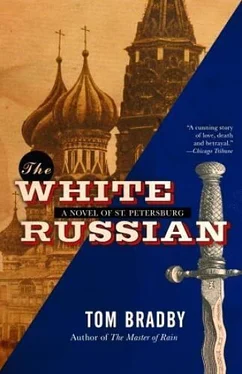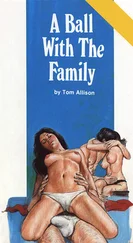There were two black automobiles on their tail now.
They were not far from Ruzsky’s dilapidated rooms here, but their surroundings could not have been more different. Built to house the government of Peter the Great at the foundation of St. Petersburg, the beautiful red and white buildings of the Twelve Colleges had long ago been taken over by the university. Like so much of the landscape of the city, they had been designed to project the power and majesty of the Russian Empire.
As the three of them climbed down from the droshky, the Okhrana’s vehicles pulled up on the other side of the street. The still-falling snow blurred the day’s journey into night.
Maretsky led them through the stone archway and up to a long, cavernous corridor. They passed a handful of students wrapped up against the cold.
Maretsky stopped, knocked once on a door to their right, and, upon receiving a reply, opened it to usher them in.
Professor Egorov’s alter ego was a tub of a man, with a drooping white mustache and steady, pale blue eyes. His dusty rooms gave the impression of someone rarely troubled by a world beyond its four walls, and for a moment, Ruzsky envied him the tranquillity of his environment.
The professor knew immediately who he was. He emerged from behind his desk and produced the murder weapon from a drawer. He handed it to Ruzsky. “It’s Persian. The date suggests it was inscribed during the period of conflict over northern Azerbaijan, which lasted through 1812 and 1813.”
“What does it say?” Ruzsky asked.
“It bears the name of a Russian general.”
“Which one?”
The professor did not relish the question. “Nicholas Nikolaevich Ruzsky. Your great-grandfather, I assume. Or a generation before?” He shook his head. “It belongs to your father?”
“Sandro,” Pavel called as Ruzsky marched down the outer corridor. But Ruzsky was no longer listening. He moved rapidly away, eager for the cold night air to clear his head.
“Sandro, wait,” Pavel called again, his voice echoing in the hallway. Ruzsky did not stop.
S now swirled around the entrance to the house in Millionnaya Street. The light above its door cast thin slivers of light into the night. Ruzsky had to knock three times before there was an answer.
As Peter opened the door, Ruzsky was swept into the hall by a gust of air that scattered snow halfway up the stairs.
“It’s a terrible night,” Peter told him.
“Is my brother here?”
“I believe so, yes sir.”
Ruzsky removed his sheepskin hat and overcoat, dusted off the snow, and handed them to the young servant. He began to climb the stairs.
The upper part of the house was in darkness.
Ruzsky moved slowly through the shadows. He tried the room on the first floor where Ingrid and his brother were officially quartered, but it was empty.
He checked all the other bedrooms on the same level, including his father’s, but there was no sign of anyone.
He returned to the center of the landing. “Dmitri?” He walked up the stairs to the second floor. “Dmitri?”
He moved to the wooden steps that led to the attic, and began to climb them.
“Dmitri?”
He checked his own room-now Michael’s-but it was empty, as was the one opposite. Ruzsky glanced at the soldier at the end of Ilusha’s bed and the elephant on the shelf above it.
As he emerged, he sensed movement and spun around. Peter was at the bottom of the stairs. “Your brother has just gone out, sir. He said you would know where to find him. ‘Where this began,’ he said.” The servant held up a small key. “He asked me to give you this.”
Downstairs, Ruzsky walked to the far wall of his father’s study, took down the painting, and slipped the key into the lock of the safe.
Alongside his mother’s jewelry, he found large bundles of banknotes, some in rubles, some sterling, some United States dollars. At the back of the safe was an envelope marked with the imperial seal and his father’s name and the instruction By hand.
Ruzsky returned to the desk and opened the envelope. He pulled out a thin sheaf of papers. Wrapped around them was a note with the imperial eagle at its head.
Nikolasha, I enclose just some of what they have to offer. Vasilyev says he has been unable to recover the rest and may not be able to do so before the weekend. The possibility of their publication then is still, therefore, significant. I feel that we must do as he suggests; perhaps not all of the gold reserves, but a significant proportion should be moved to the vault out here. He will need you to sign the order. We are considering all other options, but His Majesty will not consider recalling any further battalions.
Vasilyev says the movement of the gold should begin before this information is broadcast in the city. The atmosphere here alternates between panic and denial, so I suggest, my old friend, that we act upon our own initiative -S.
Inside was a series of neat, handwritten notes that each began with the same instruction in the left-hand corner: For immediate transfer.
December 2, 1916. Povroskoe from Tsarskoe Selo for Novy. You have not written anything. I have missed you terribly. Come soon. Pray for Nicholas. Kisses -Darling.
Ruzsky put the first down on the desk. Povroskoe was a remote village in the Russian interior. It had been home to the peasant priest Grigory Rasputin, who also went by the name Novy. Tsarskoe Selo meant the Alexander Palace and, by implication, the Empress.
They were messages for transcription by the telegraph office from the Empress of the Russias to a peasant priest.
April 9, 1916. Povroskoe from Tsarskoe Selo for Novy. I am with you with all my heart, all my thoughts. Pray for me and Nicholas on the bright day. Love and kisses -Darling.
Ruzsky stared at the neat, careful hand.
He turned to the last note. This was an actual telegram, complete with the stamp of the Povroskoe office.
December 7, 1914. From Petrograd for Novy. Today, I shall be back in eight days. I sacrifice my husband and my heart to you. Pray and bless. Love and kisses -Darling.
Ruzsky sat back in his father’s chair.
He understood all too well the tension he had seen in Shulgin’s face. The rule of the Romanovs could not possibly survive the publication of such material.
He put the documents back into the safe, locked it, and put the key in his pocket.
Lights from the upper floors of the Winter Palace blazed defiantly into the gloom as Ruzsky stared out at the frozen Neva.
He saw a dark figure in the center of the ice.
He hesitated for only a moment, before stepping out and walking purposefully toward his brother, blocking his old fear from his mind. The marine police had placed no warning flags here, or none that he could see.
Dmitri wore a long, dark blue regimental overcoat and a sheepskin hat. His hands were thrust deep into his pockets.
They stared at each other through the falling snow.
“Don’t try to stop me, Sandro.”
Ruzsky did not respond.
“Father is dead. You are absolved of your responsibilities.”
“It’s not about responsibility. It’s about love.”
The word hung between them. Dmitri’s expression softened. He took off his hat. “Did you open the safe?”
“Yes.”
“You understand, then?”
“I do now.” Ruzsky wiped the snow from his eyes and face.
Dmitri lowered his head. He stared at his hat, flakes gathering upon his hair. Ruzsky thought he looked handsome in the darkness, and young-something like the boy he remembered.
“I could have warned him,” Dmitri said, a terrible guilt etched into his face just as it had been in Maria’s last night. “I knew they planned to steal the gold. I knew they had to trick Father to do it.”
Читать дальше












